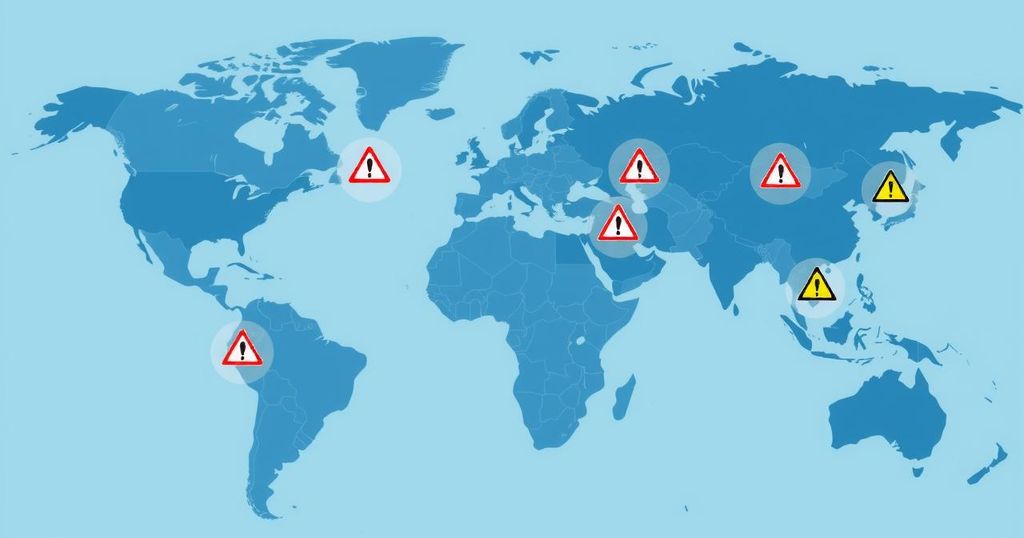The U.S. Department of State has issued heightened travel advisories for 25 countries, including Russia, Yemen, and Ukraine, drinking concerns around crime and political instability. Level 3 and Level 4 advisories indicate a significant risk, prompting American travelers to reevaluate their plans amidst rising violence and civil unrest. The travel industry will likely adapt to these warnings as safety remains a priority for tourists during the upcoming spring break season.
Recently, the U.S. Department of State heightened travel advisories for numerous spring break destinations, including notable countries such as Russia, Jamaica, Colombia, and Belarus, among others. These advisories, which range from Level 3 (Reconsider Travel) to Level 4 (Do Not Travel), stem from growing concerns about crime, political turmoil, gang activities, and other serious threats in these regions, particularly as the spring break season approaches.
The increase in advisories reflects a broader shift in security perceptions regarding various tourist destinations traditionally favored by American travelers. Notable areas are experiencing rising levels of violent crime, including armed robberies and kidnappings, prompting U.S. authorities to provide urgent safety warnings for their citizens visiting these regions.
In recent years, an increasing number of nations have received U.S. Department of State Level 4 advisories, indicating a severe risk that necessitates avoidance by American citizens. Such advisories are issued when conditions involving conflict, political instability, or extreme circumstances pose a significant threat to travelers’ safety. Succeeding into 2025, the advisories spotlight heightened risks across global regions, compelling travelers to reevaluate their travel intentions.
The article examines not only the countries currently receiving Level 4 advisories but also the rationale behind these advisories and their implications for global tourism. The U.S. travel advisory system serves to inform travelers of potential hazards, categorized into four distinct levels based on the nature of risks present.
Countries like Afghanistan continue to rank as some of the most perilous for travelers. The resurgence of the Taliban has instigated widespread violence, which encompasses bombings and kidnappings, alongside severely limited emergency services. Subsequently, U.S. citizens are counseled against any travel to Afghanistan amid ongoing dangers.
Similarly, the Democratic Republic of the Congo faces longstanding conflicts, particularly in its eastern regions, leading to frequent violence driven by militia activities and a deteriorating infrastructure challenging the safety of travelers. Travel to the DRC is strongly discouraged as the nation grapples with humanitarian crises further exacerbated by disease outbreaks.
Lebanon is characterized by political instability, economic fragility, and increased tensions, leading to unsafe conditions for tourists. Despite its vibrant cultural reputation, a Level 4 advisory has been issued, advising against all travel due to the volatile environment. The Central African Republic faces severe armed conflict that threatens both residents and visitors, and thus, travel is deemed extremely dangerous for U.S. citizens.
Moreover, Belarus bears the brunt of political repression under President Alexander Lukashenko, presenting risks to travelers who may face harassment or arrest related to civil unrest. Similarly, Iraq and Ukraine remain fraught with danger; ongoing violence spans across these nations due to terrorist activities and armed confrontations.
Venezuela, plagued by political and economic turmoil, presents significant risks including crime and human rights violations, further compelling the U.S. government to warn against travel. Haiti, grappling with gang violence and crime, also receives a Level 4 advisory, as extensive lawlessness creates perilous conditions for visitors. The tense political climate in Iran compounds the risks for travelers, primarily due to potential detentions of foreign nationals.
These countries with Level 4 advisories reflect common challenges: ongoing conflict, political instability, and threats of violence, which have elicited comprehensive travel bans by the U.S. Government. Nevertheless, some travelers may still attempt visits, often uninformed or disregarding the advisories in place.
For individuals still inclined to travel to high-risk areas, experts emphasize following crucial safety protocols, such as checking travel advisory updates, enrolling in the Smart Traveler Enrollment Program (STEP), securing comprehensive travel insurance, and maintaining contact with local embassies, ensuring informed decisions regarding their security.
The surge in Level 4 advisories holds significant implications for the travel industry as well, encouraging airlines and tour operators to adapt their practices and safety protocols correspondingly. As spring break approaches, the resulting effects could reshape travel expenditures and offerings, aligning them with the changing landscape of safety concerns in international tourism.
At this juncture, it is essential to understand the key reasons driving the advisories, including heightened crime and political instability along with inadequate emergency services. Despite these challenges, the allure of many affected destinations may persist among tourists, who may remain unaware of recent updates or voluntarily disregard their seriousness. With the security environment at its most unpredictable, American travelers are urged to stay vigilant and informed while planning their journeys.
In summary, as the onset of spring break approaches, heightened travel advisories from the U.S. Department of State underscore significant safety risks in numerous popular destinations across Latin America and the Caribbean. Issued warnings within Level 3 and Level 4 categories serve as a precautionary measure intended to protect American travelers from potential threats. The travel industry must respond effectively to these advisories by adapting offerings and increasing safety measures while travelers must remain informed, ensuring well-planned and secure vacation experiences.
Original Source: www.travelandtourworld.com




